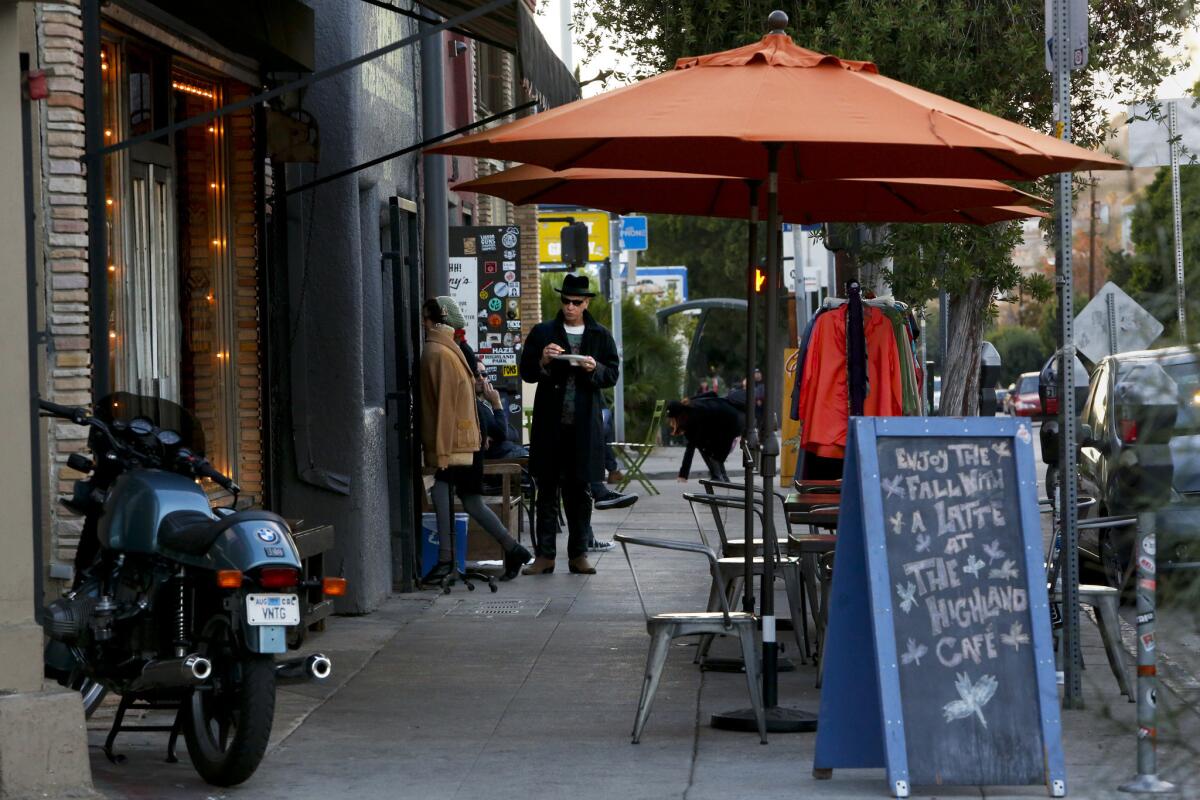Op-Ed: Before it was a hipster haven, I called Highland Park home. Oh, how I miss its rough edges

Soon after I moved into my house, I was handed a jar of Nescafe at the local bakery when I ordered a cup of coffee. When I went looking for a bottle of red wine at the local liquor store, I was pointed toward the refrigerator.
That was Highland Park 20 years ago, long before Figueroa Street and York Boulevard became an epicenter of L.A. hip, with endless purveyors of $5 cold brews, $50 vintage T-shirts and succulents in minimalist earthenware. Blame it on Vogue or public radio’s “Marketplace” or the many other media outlets that began recognizing this part of town a few years ago as an “it” neighborhood: Highland Park isn’t what it used to be.
With each passing day, it feels less like a neighborhood and more like a tourist attraction for millennials. The gritty discount shops have been replaced with gourmet restaurants and bars with bouncers. There’s too much traffic. Not enough parking. And a whole lot of noise.
It feels strange to have spent so many years wishing the neighborhood would get a decent coffee shop — and then to have that desire fulfilled tenfold — only to feel the need to flee because it no longer feels like home. It’s unsettling to think I may have aged out of the place I bought as my forever home.
Gentrification was the last thing on my mind in 2000. I moved to the neighborhood because it was what I could afford on one salary. Mine. Highland Park was barely on my radar — I thought I had been house-hunting in Eagle Rock.
But I soon discovered where I was. Days after I moved in, the sidewalk in front of my house was tagged with spray-paint in language I couldn’t interpret. I learned my neighbor was running an unofficial auto shop in our shared driveway and that dogs weren’t pets so much as security systems.
Neighbors who’ve moved in more recently are what you’d expect, young professionals. They walk their dogs, drive nice cars and are friendly, for the most part. They’re just not the old-timers I’m used to.
I know gentrification comes in waves, that it’s a double-edged sword. The benefits of new businesses and less crime and increasing wealth are not shared equally and are offset by the displacement of cultures and residents. What I’m experiencing now is a version of what my Latino neighbors must have felt when I first bought my house: What is she doing here?
At the time, I was relatively young and didn’t own a car. Just a Ducati motorcycle. They speculated that I was a drug dealer, because I had unwittingly made my home in Northeast L.A.’s Mexican American gang territory. Otherwise, why would I move there?
I realized it was gang territory after discovering switchblades in the grass at the local park. Once, as I pushed my toddler son in a swing, the dad next to me did the exact same thing — while throwing gang signs to a buddy. Highland Park was a rough place then, but it appealed to my sense of adventure.
That edginess sometimes came with unease, but I appreciated Highland Park for the diamond in the rough that it was.
It had great bones. The main drag along Figueroa had the same familiar Main Street amenities I grew up with in the Midwestern suburbs: a movie theater, a pet shop, shoe repair, grocery store. Granted, they were a bit run down, but I could walk to do errands, a thrill in Los Angeles. My favorite restaurants quickly became a pupuseria and a pizza joint, complete with fluorescent lighting.
These days, the pet shop and shoe repair are gone, replaced by a fancy barbershop and celebrity chef Nancy Silverton’s Triple Beam Pizza. My son and I are now regulars at these places, too. But we yearn for what used to be.
Long before Highland Park Bowl, with its $60-per-hour bowling lanes, there was Mr. T’s, a rundown punk enclave with $2 drink specials, and the Gutter cafe, which served breakfast steps away from where the bartender poured booze. And the gastropub that takes its name from York Boulevard? It was once a Chinese restaurant called the Dragon, where you could reliably find a seat in a red pleather banquette.
Everything seemed a little more eccentric and a lot less expensive back then.
Gone are the days when I’d tell people where I lived and they had no idea what I was talking about. “You mean Hancock Park?” they’d ask. It was a laughable comparison then, but not so now. The value of my little, three-bedroom bungalow has increased to the point where I could never dream of buying it now.
Sure, I’m fortunate to own a house here when so many other people are priced out of today’s market. And yet, I feel like I need to escape to somewhere that has yet to be discovered.
On days when my friends can’t find parking, or when I’ve been woken up yet again at 1:30 a.m. by blaring music from the bar one street over or its drunken patrons, I find myself cruising Redfin, considering nearby alternatives.
Pasadena? Too sleepy. South Pasadena? Too Mayberry. El Sereno? I don’t want to live through another neighborhood as it transitions from a place of potential with a strong sense of community to another hipster haven. The sweet spot in that transitional middle is too short lived.
Been there. Done that.
Truthfully, I don’t want to live anywhere else except maybe the neighborhood I once knew.
Susan Carpenter is a freelance journalist and former Times staff writer.
More to Read
A cure for the common opinion
Get thought-provoking perspectives with our weekly newsletter.
You may occasionally receive promotional content from the Los Angeles Times.










